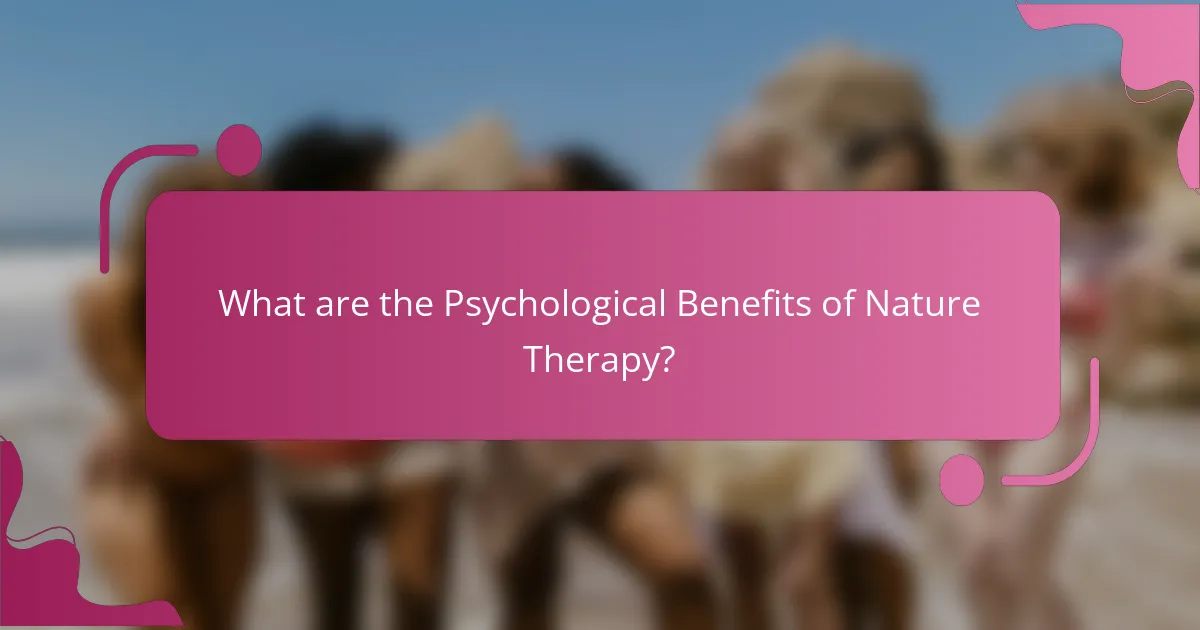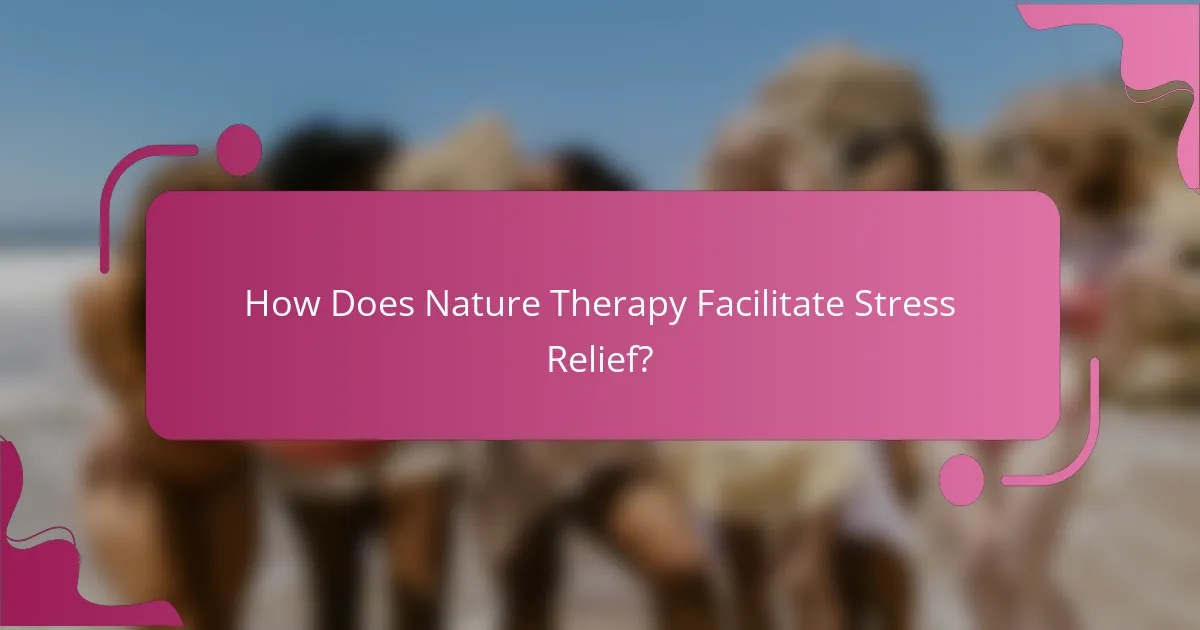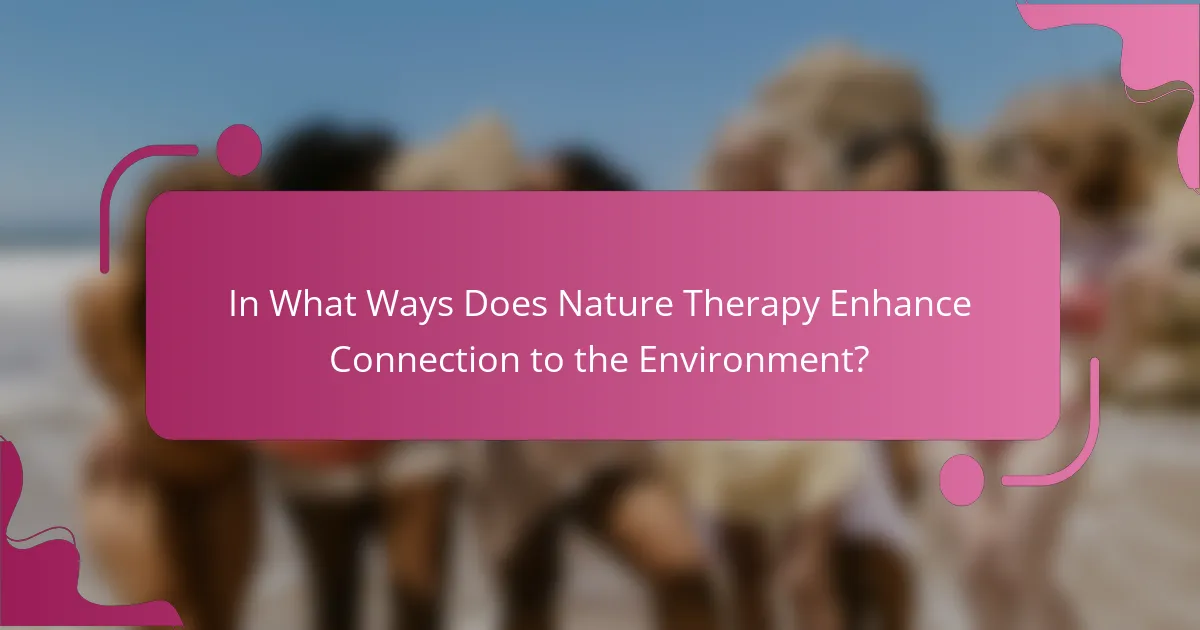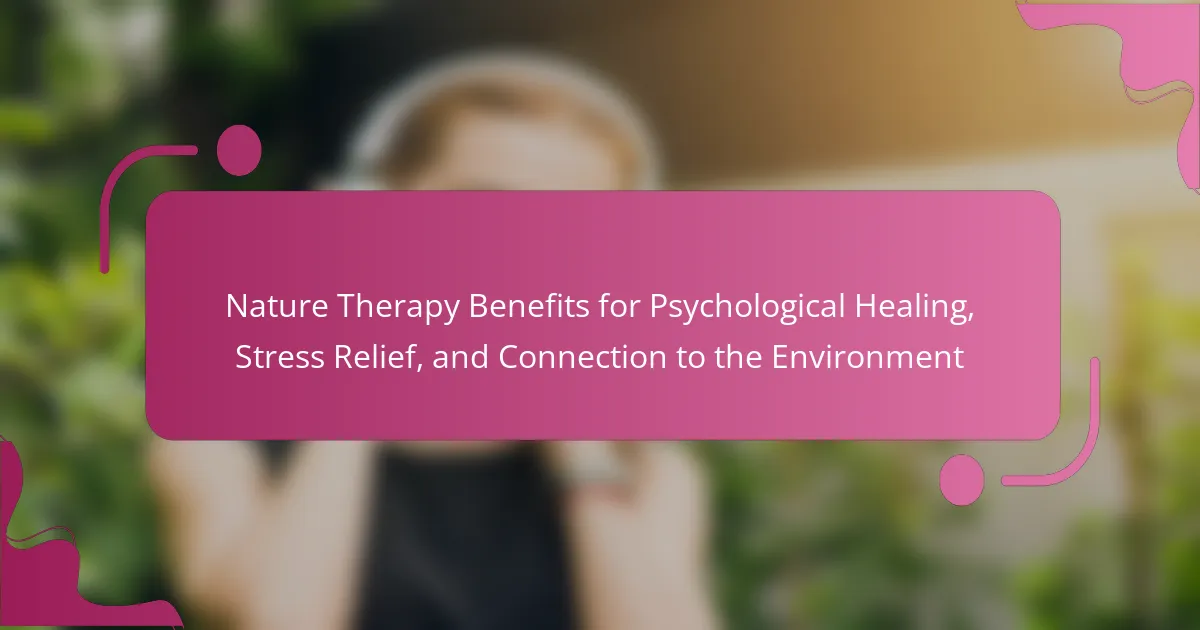Nature therapy significantly enhances psychological healing by providing stress relief and fostering a connection to the environment. Engaging with nature lowers cortisol levels and improves mood, leading to better emotional well-being. This approach promotes mindfulness and encourages positive social interactions, while unique experiences in natural settings can yield profound personal insights. Regular immersion in nature can transform mental health outcomes and strengthen one’s bond with the ecological world.

What are the Psychological Benefits of Nature Therapy?
Nature therapy offers significant psychological benefits, including stress relief, enhanced mood, and improved emotional well-being. Engaging with nature can lower cortisol levels, which reduces stress and anxiety. Studies show that spending time in natural settings can lead to a 30% improvement in mood and a 20% decrease in feelings of stress.
Nature therapy fosters a deep connection to the environment, promoting mindfulness and a sense of belonging. This connection enhances self-awareness and encourages positive social interactions. Additionally, exposure to green spaces has been linked to lower rates of depression and improved cognitive function.
The unique attribute of nature therapy is its holistic approach, integrating physical activity with mental health benefits. Rarely, individuals may experience profound personal insights during nature therapy sessions, leading to transformative healing experiences.
In summary, nature therapy serves as a powerful tool for psychological healing, offering stress relief and fostering a meaningful connection to the environment.
How Does Nature Therapy Promote Emotional Well-Being?
Nature therapy enhances emotional well-being by fostering psychological healing, relieving stress, and strengthening connections to the environment. Engaging with natural settings reduces cortisol levels, promoting relaxation. Studies show that spending time outdoors can improve mood and decrease anxiety. Nature therapy also encourages mindfulness, helping individuals reconnect with their surroundings. This holistic approach supports overall mental health by integrating physical activity and social interaction in natural settings.
Which Psychological Conditions Can Be Alleviated by Nature Therapy?
Nature therapy can alleviate various psychological conditions, including anxiety, depression, and stress. Engaging with nature promotes relaxation and emotional well-being. Studies indicate that spending time outdoors can reduce cortisol levels, leading to improved mood and decreased feelings of anxiety. Nature therapy also fosters a sense of connection to the environment, enhancing overall mental health. Activities like hiking and gardening provide unique therapeutic benefits, offering both physical exercise and mental clarity.
What Role Does Nature Play in Reducing Anxiety and Depression?
Nature plays a vital role in reducing anxiety and depression through its therapeutic benefits. Exposure to natural environments has been linked to lower stress levels, improved mood, and enhanced emotional well-being. Engaging with nature encourages mindfulness and promotes physical activity, both of which contribute to psychological healing. Studies show that spending time outdoors can significantly decrease symptoms of anxiety and depression, providing a unique attribute of nature therapy that distinguishes it from conventional treatments. As a result, individuals often report a deeper connection to their environment, fostering a sense of belonging and community.

How Does Nature Therapy Facilitate Stress Relief?
Nature therapy effectively facilitates stress relief by promoting relaxation and emotional healing. Engaging with natural environments reduces cortisol levels, enhancing overall well-being. Studies show that spending time outdoors can improve mood and decrease anxiety. Nature therapy fosters a sense of connection to the environment, encouraging mindfulness and presence. This unique attribute of immersion in nature allows individuals to experience profound psychological benefits, leading to reduced stress and improved mental health outcomes.
What Mechanisms Underlie Stress Reduction in Natural Settings?
Nature therapy reduces stress through mechanisms like increased serotonin levels, improved mood, and enhanced mindfulness. Exposure to natural environments fosters relaxation, lowers cortisol levels, and promotes a sense of belonging. Studies indicate that spending time in nature can lead to a 50% decrease in stress levels. Additionally, engaging with nature encourages physical activity, which further alleviates stress. The unique attribute of nature therapy is its ability to create a deep emotional connection to the environment, enhancing overall psychological healing.
How Can Nature Therapy Be Integrated into Daily Routines for Stress Management?
Nature therapy can be seamlessly integrated into daily routines for effective stress management. Engage with nature through activities like walking in parks, gardening, or simply sitting outdoors. These practices enhance psychological healing and foster a deeper connection to the environment.
Incorporating nature therapy can involve specific strategies. For instance, dedicate time each day for a nature walk, even if it’s just for fifteen minutes. This exposure can reduce cortisol levels, promoting relaxation. Additionally, consider mindfulness exercises in natural settings to increase awareness and reduce anxiety.
Utilise nature-related hobbies like birdwatching or hiking to create regular touchpoints with the environment. These activities not only relieve stress but also cultivate a sense of belonging and peace.
Lastly, establish a routine that includes nature therapy elements, such as morning meditation outdoors or evening strolls. Consistent engagement with nature can lead to long-term psychological benefits, enhancing overall well-being.

In What Ways Does Nature Therapy Enhance Connection to the Environment?
Nature therapy enhances connection to the environment by fostering mindfulness and promoting emotional healing. Participants often experience increased awareness of natural surroundings, leading to a deeper appreciation for ecological systems. Engaging in nature therapy can reduce stress and anxiety, reinforcing the psychological benefits of spending time outdoors. Studies show that nature exposure can improve mood and enhance feelings of belonging, ultimately strengthening the bond between individuals and their environment.
How Does Immersion in Nature Foster Environmental Awareness?
Immersion in nature enhances environmental awareness by fostering a deep emotional connection to the ecosystem. This connection promotes a sense of responsibility towards environmental stewardship. Nature therapy benefits psychological healing by reducing stress and anxiety, which allows individuals to engage more meaningfully with their surroundings. Research indicates that spending time in natural settings increases pro-environmental behaviours, such as recycling and conservation efforts. Engaging with nature can also lead to a greater appreciation for biodiversity and the importance of preserving natural habitats.
What Practices Encourage a Deeper Connection to Natural Spaces?
Engaging with nature through practices like forest bathing, gardening, and mindfulness walks fosters a deeper connection to natural spaces. These activities promote psychological healing, reduce stress, and enhance environmental awareness. Nature therapy has been shown to lower cortisol levels, improve mood, and increase feelings of belonging. For instance, spending time in green spaces can lead to a 20% reduction in stress levels, highlighting its significant impact on mental health. By immersing oneself in nature, individuals can cultivate a profound sense of connection and well-being.

Which Unique Attributes of Nature Therapy Improve Healing Outcomes?
Nature therapy enhances healing outcomes through unique attributes like immersive experiences, natural stimuli, and stress reduction. These elements foster emotional resilience and promote well-being. Engaging with nature can lower cortisol levels, improve mood, and enhance cognitive function. Nature therapy’s unique attribute of fostering a deep connection to the environment encourages individuals to develop a sense of belonging and purpose, which is crucial for psychological healing.
How Do Specific Environments Influence the Effectiveness of Nature Therapy?
Specific environments significantly enhance the effectiveness of nature therapy by providing unique sensory experiences. Natural settings like forests, beaches, and mountains offer diverse stimuli that promote psychological healing and stress relief. Research indicates that exposure to greenery reduces cortisol levels, leading to improved mental health. For example, urban parks can provide a necessary escape from city stressors, enhancing feelings of connection to the environment. Additionally, environments with water bodies, such as lakes or rivers, are associated with lower anxiety levels, creating a calming effect. These unique attributes of specific environments contribute to the overall benefits of nature therapy.
What Unique Therapeutic Approaches Incorporate Nature?
Nature therapy uniquely incorporates therapeutic approaches such as ecotherapy, forest bathing, and horticultural therapy. These practices enhance psychological healing, reduce stress, and foster a deeper connection to the environment.
Ecotherapy involves structured outdoor activities that promote mental well-being through nature immersion. Studies indicate that spending time in natural settings can lower cortisol levels, improving stress resilience.
Forest bathing, originating from Japan, emphasizes sensory engagement with nature, leading to enhanced mood and cognitive function. Research shows that participants report significant reductions in anxiety and depression after forest bathing sessions.
Horticultural therapy utilises gardening as a therapeutic medium, allowing individuals to cultivate plants while improving emotional health. This approach has been shown to boost self-esteem and provide a sense of accomplishment.
These unique therapeutic approaches highlight nature’s role in holistic healing, underscoring its benefits for psychological well-being and environmental connection.

What Are the Rare Attributes of Nature Therapy That Enhance Its Effectiveness?
Nature therapy possesses rare attributes that significantly enhance its effectiveness, such as the ability to foster deep emotional connections and promote a sense of belonging. These attributes include unique sensory experiences, like the calming sounds of nature, which can trigger positive psychological responses. Additionally, nature therapy often incorporates elements of spontaneity, allowing for personalised and adaptive healing experiences. The integration of local flora and fauna creates a tailored therapeutic environment, maximising individual engagement and emotional resonance. Such rare attributes not only deepen the therapeutic impact but also encourage sustained mental well-being.
How Do Cultural Perceptions of Nature Affect Therapy Outcomes?
Cultural perceptions of nature significantly influence therapy outcomes by shaping individuals’ connections to the environment. Positive views of nature enhance psychological healing, stress relief, and overall well-being. Studies show that individuals who perceive nature as restorative experience greater benefits from nature therapy, such as reduced anxiety and improved mood. Furthermore, cultural practices that emphasise harmony with nature can lead to more effective therapeutic experiences, as clients engage deeply with natural settings. In contrast, negative perceptions may hinder therapeutic progress, emphasising the importance of understanding cultural backgrounds in therapy.
What Innovative Nature Therapy Techniques Are Emerging in 2025?
Innovative nature therapy techniques emerging in 2025 focus on immersive experiences and technology integration. Techniques like forest bathing, eco-therapy, and virtual reality nature simulations enhance psychological healing, stress relief, and environmental connection. Research indicates that these methods improve mental health outcomes by fostering mindfulness and reducing anxiety. As a result, practitioners are increasingly incorporating these approaches into therapeutic settings to maximise benefits for clients.

What Best Practices Should Be Followed for Effective Nature Therapy?
To achieve effective nature therapy, individuals should immerse themselves in natural environments regularly. Engaging with nature enhances psychological healing, promotes stress relief, and fosters a deeper connection to the environment.
1. Schedule regular outdoor activities to experience diverse natural settings.
2. Practice mindfulness during nature walks to increase awareness of surroundings.
3. Incorporate physical activities like hiking or gardening to boost endorphins.
4. Join group nature therapy sessions to build community and share experiences.
How Can Individuals Tailor Nature Therapy to Their Needs?
Individuals can tailor nature therapy to their needs by selecting activities that resonate with their personal preferences and emotional goals. Engaging in outdoor activities like hiking or gardening can enhance psychological healing and reduce stress. Personalising the experience may involve choosing specific environments, such as forests or beaches, that evoke positive memories or feelings of calm.
Incorporating mindfulness practices, such as meditation in nature, can deepen the connection to the environment and promote emotional well-being. Setting achievable goals, like spending a certain amount of time outdoors each week, can also provide structure and motivation.
Additionally, individuals can explore various forms of nature therapy, such as ecotherapy or forest bathing, to find what works best for them. Keeping a journal to track experiences and emotions during these activities can further enhance the therapeutic effects and foster a stronger bond with nature.
What Common Mistakes Should Be Avoided in Nature Therapy?
To maximise the benefits of nature therapy, avoid common mistakes such as setting unrealistic expectations, neglecting personal preferences, and overlooking safety concerns.
1. Setting unrealistic expectations: Many expect immediate results from nature therapy, which can lead to disappointment. Healing takes time and consistent practice.
2. Neglecting personal preferences: Engaging in activities that do not resonate personally can hinder the experience. Choose environments and activities that feel enjoyable.
3. Overlooking safety concerns: Failing to consider potential hazards in natural settings can lead to accidents. Always prioritise safety by being aware of your surroundings and preparing adequately.
4. Ignoring the social aspect: Nature therapy can be enhanced through shared experiences. Isolating oneself may limit the psychological benefits derived from social connections.
